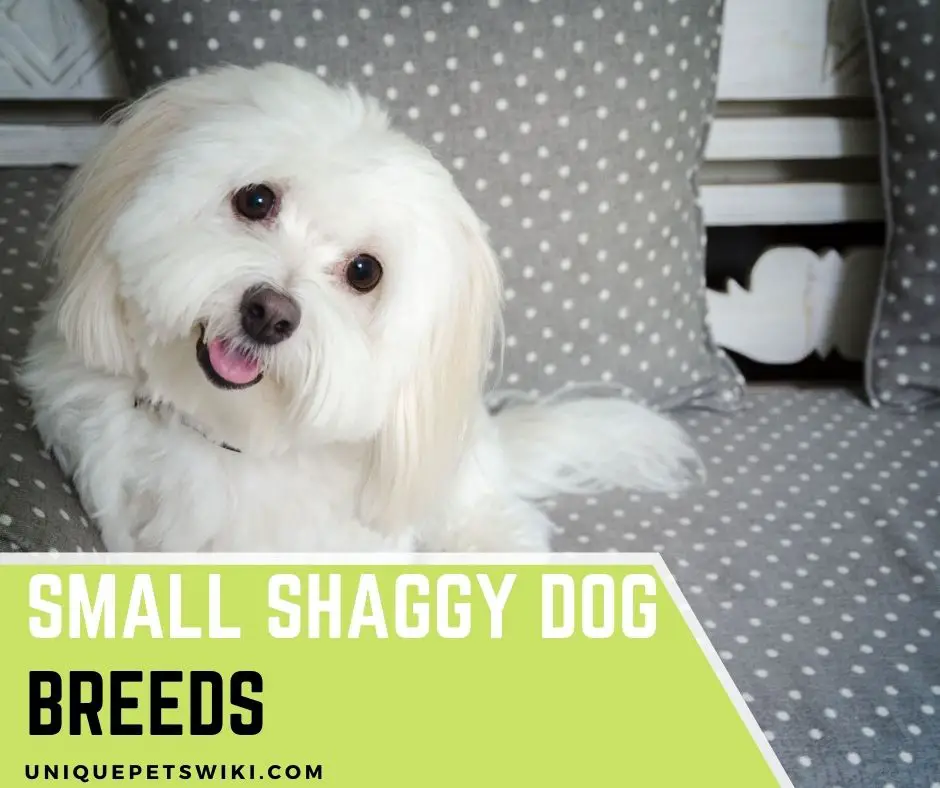Small woolly and fluffy dog breeds make great pets to any category of herpetologist. However, choosing the best breed amongst the list of numerous breeds and knowing the right care to give can be a challenge. This article, “Small Shaggy Dog Breeds” seeks to address this problem by giving you all the information you need to choose the best and care for your new friend.
There is increasing popularity of small fluffy dog breeds these days, and we wanted to find out why. It’s no secret that the American Kennel Club determines the most popular breed in the U.S. is the Labrador Retriever, neither smaller nor fluffier.
Still, when you put fluffiness in its category, people begin to melt, and the cute factor kicks in. There is a wide diversity in the temperaments, origins, and care and grooming needs of these breeds.
They do, however, share two things in common: their hair size and length. Many of them are very small. Dogs with a lot of hair that do not shed much are known to be hairy.
How do they differ from other canines as a distinct group? Let’s discuss everything in detail below.
Contents
What Are Small Shaggy Dog Breeds?
Small shaggy dogs are cute, tiny, fluffy companions that are playful and go well with families living in apartments or condos. They are so adorable you wont stop yourself from cuddling them all day.
It is truly a delight to run your hands through a puppy’s thick, fluffy coat. That’s a dream come true.
It is usually the thick, often upright coat of fluffy dogs that gives them their aesthetic feel. Almost all of them are small, which makes them even more enjoyable to cuddle with.
These small fluffy dog breeds are also perfectly suited to city living. Consider the Shih Tzu, Bichon Frise, or Lhasa Apso if you are searching for a pup that enjoys individual attention.
Apart from these, there are a few more breeds down the line that makes the perfect companion. Read more and learn about each breeds’ temperament, size, appearance, and associated health issues.
Top 10 Small Shaggy Dog Breeds That Stay Small & Make Great Pets
One of the fluffiest and smallest dog breeds is the Bichon Frise. Despite its size, this little dog is quite the character. The Pomeranian and Havanese breeds are also dog breeds that could challenge the Bichon Frise.
We’ll examine 10 of these breeds in the following sections and see what makes them so amazing.
| Small Shaggy Breeds | Size (smallest to larger) | Appearance | Cost |
| Cockapoo | 14 – 15 inches | Curly or wavy coat with long shaggy ears | $1500 – $2600 |
| Bichon Frise | 9 – 11 inches | White fluffy fur with black eyes and nose | $250 – $2500 |
| Shih Tzu | 7 – 11 inches | Owl-headed, small muzzle dog | $750 – $3000 |
| Pomeranian | 7 – 12 inches | Wedge-headed dog with erect ears | $500 – $1500 |
| Toy Poodle | 9 – 11 inches | Square-built with hanging ears close to head | $1200 – $2000 |
| Lhasa Apso | 10 – 11 inches | Long, straight and dense coat | $1700 – $5500 |
| Coton De Tulear | 8 – 12 inches | Dark, wide-set eyes and fluffy coat | $2000 – $3000 |
| Havanese | 9 – 12 inches | Sturdy, drop-eared dog | $1000 – $1500 |
| Pekingese | 6 – 9 inches | Compact size and large prominent eyes | $750 – $3000 |
| Yorkshire Terrier | 8 – 9 inches | Toy size, silky coat | $1500 – $3000 |
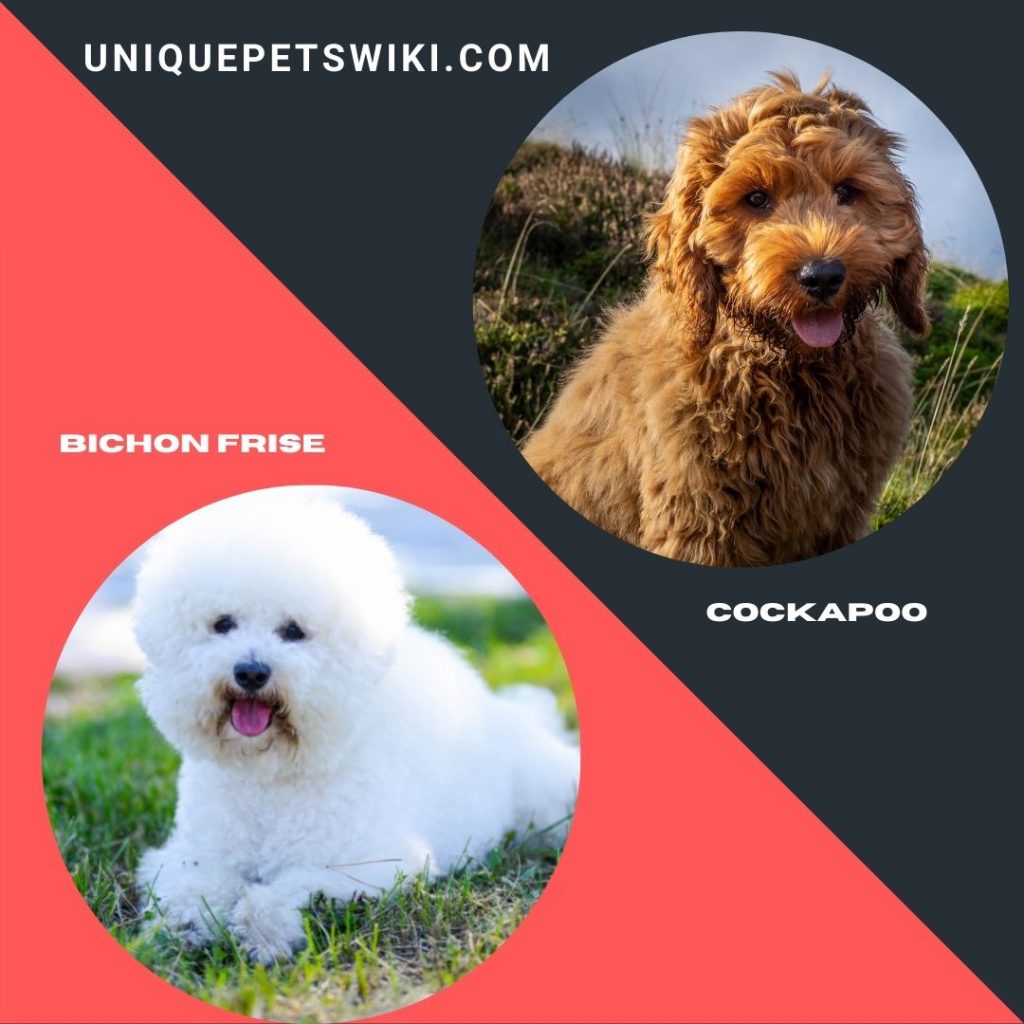
Cockapoo
Cockapoo is a Cocker Spaniel and Poodle crossbreed that has a soft and dense coat.
According to Wikipedia, Cockapoo has a life expectancy of 13 to 15 years with a weight between 20-24 lbs and 14-15 inches tall.
They have a sweet temperament which makes them ideal for homes with children and elderly adults.
Two meals of 1/4 – 3/4 cup of adult food per day are recommended for an adult Cockapoo.
Bichon Frise
Bichon Frise has a long, curly, and double-layered coat in white, cream, or apricot color.
As per Wikipedia, frequent grooming visits are required to prevent dander and dead hair from spreading across your home surroundings.
They are considered fairly healthy compared to other breeds but do have their share of inherited diseases such as bladder infections, cataracts, and more.
Bichons are heavy eaters. A puppy requires at least three meals a day, whereas an adult only needs two meals in a day.
These dogs are tiny, and their height stays somewhere between 9 to 12 inches throughout life.
Shih Tzu
Shih Tzu has soft, fluffy, and gorgeous fur, which requires frequent brushing to keep them from tangling.
Generally, people associate the Asian toy dog, Shih Tzu, with China. However, this dog breed originated from Tibet, as per Wikipedia.
On average, a Shih Tzu eats 1 or 1 ½ cup of food in 24 hours. But certain factors can increase their hunger pangs, so you can always alter the diet.
Shih Tzu is susceptible to some common health issues such as Hip Dysplasia, ear infections, patellar luxation, and more.
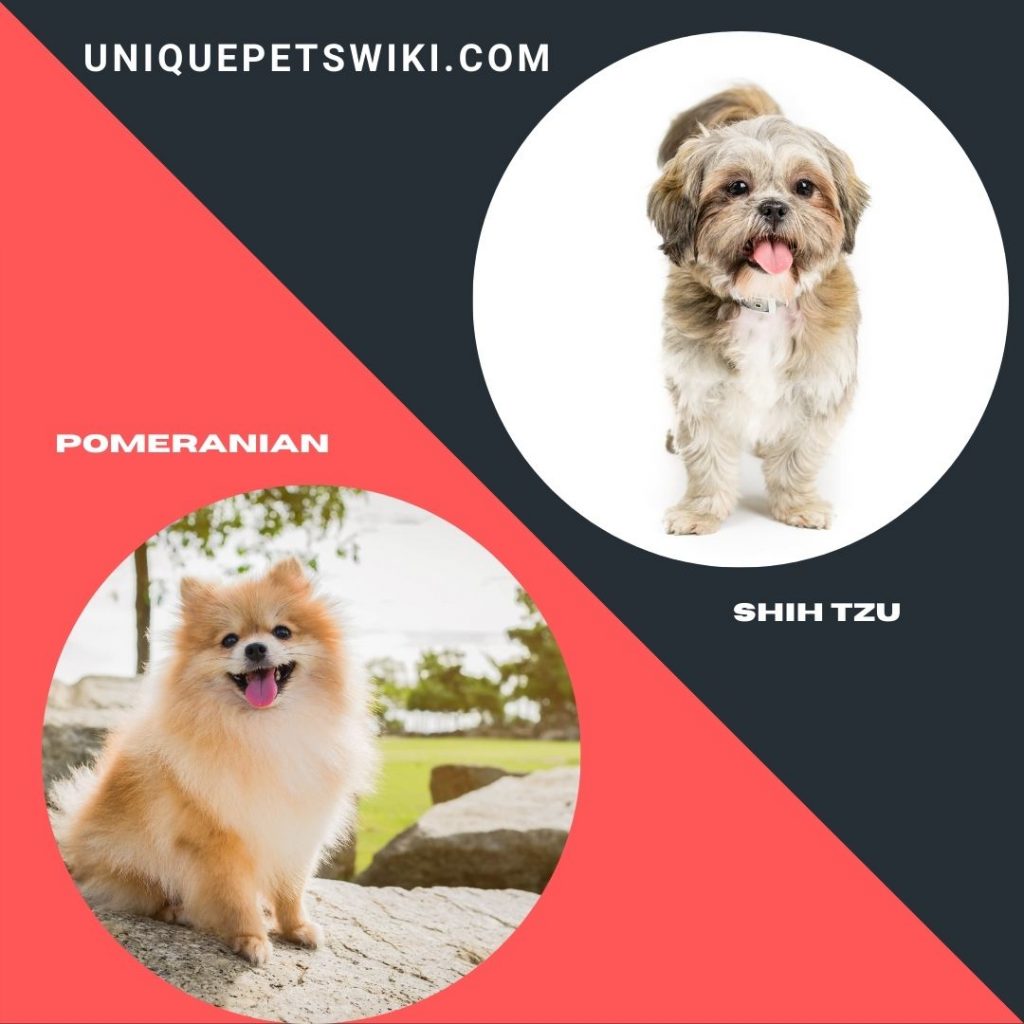
Pomeranian
Pomeranians are small spitz-type dog breeds that have a soft, long, and fluffy top coat.
According to Wikipedia, Pomeranian had become world-famous in the 18th century when Queen Victoria got a small pomeranian dog.
They are healthy dogs with some rare, occurring health problems, including black skin disease, luxating patella, and tracheal collapse.
It is recommended to feed your pomeranian with two meals a day of about ¼ to ½ cup of dog food.
A typical adult pomeranian stands between 7 to 12 inches tall and weighs between 3 and 7 pounds.
Toy Poodle
Toy poodles have a thick, distinctive, and wavy coat that changes steadily throughout their life.
Poodles are called with different names in various languages. For instance, Pudel in German and Caniche in French, as published on Wikipedia.
A puppy poodle should be well fed to have the blasting energy throughout the day. They need about three meals, and adults require only two meals in 24 hours.
They are prone to major health issues like cardiomyopathy, hypoglycemia, and collapsed trachea.
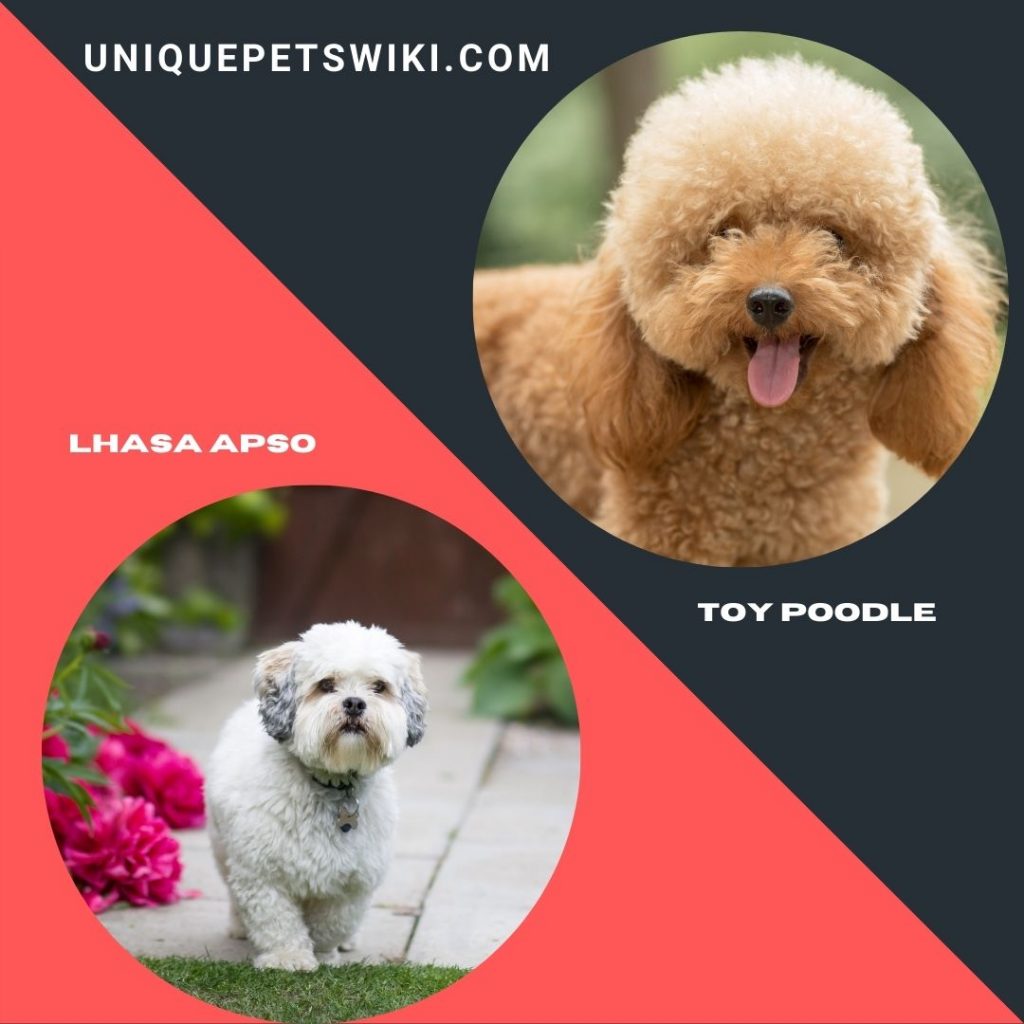
Lhasa Apso
Lhasa Apso has a heavy, dense, and straight coat that comes in various shadings of white, gold, black, and red.
According to Wikipedia, a female Lhasa Apso is comparatively smaller than a male and weighs 12 to 14 lbs.
When Lhasa Apso puppies are young, you can feed them 3 to 4 meals a day, and as they grow up, you can move to fewer meals.
The health of your Lhasa Apso can be a great concern if you don’t pay much attention initially. They get susceptible to conditions like juvenile renal disease, eye problems, etc.
Coton De Tulear
Coton De Tulear has a cotton ball-like appearance as they have a double, soft, and fluffy coat.
As per Wikipedia, Coton De Tulears are named after the Madagascar city Tulear and originated over the Malagasy channel following a shipwreck.
Coton De Tulears are friendly and outgoing social butterflies. Despite their reputation as excellent watchdogs, they are comfortable around cats, dogs, and children.
The feeding schedule might depend on the size of the dog. Tulear puppies need three meals in a day and one year, plus dogs need two bowls of food in 24 hours.
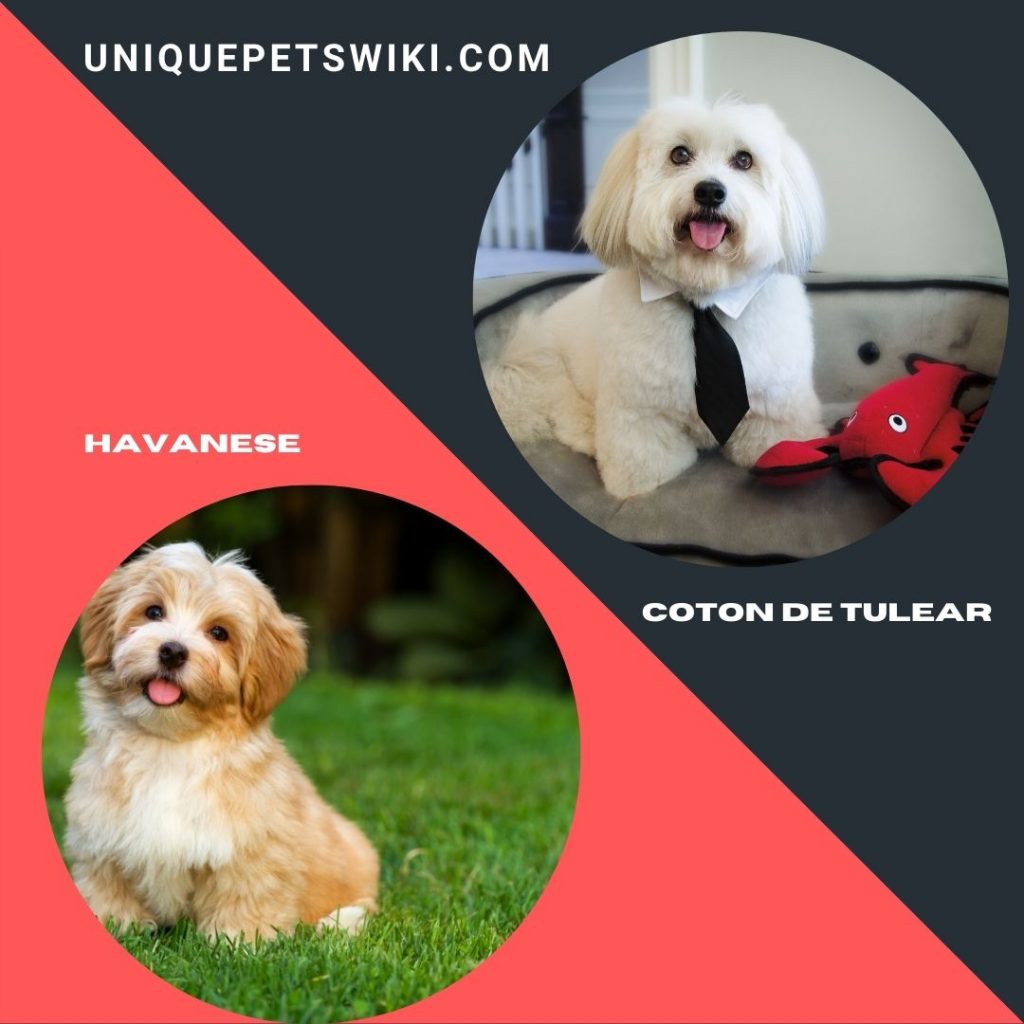
Havanese
Havanese has a long, silky, and abundant coat that doesn’t readily shed and can be wavy, curly, or straight.
Each dog’s nutritional needs will vary based on its size. Aiming for 1/2 to 1 cup a day for adult Havanese is enough.
They are healthy dogs with a few inherited health problems such as heart disease, liver disease, luxating patella, and cataracts, as per Wikipedia.
When they become attached to their owners, the Havanese are exceptionally loyal to them, often attaching to one person in particular, whom they closely follow.
Havanese puppies can cost between $1,000 and $1,500. Puppies from reputable breeders can cost as much as $3,000, but puppies from puppy mills are as low as $700.
Pekingese
Pekingese is a Chinese toy dog with straight, coarse, and fluffy fur that comes in various colors.
According to Wikipedia, Pekingese are typically 6–9 inches tall and weigh 7–14 lbs. They can be much smaller at times.
It is recommended that PetKing puppies be fed three times a day until they reach four months. It is necessary to feed a puppy frequently when it is young.
It is important to be cautious about who you buy a Pekingese from because they have some health issues that can be concerning, such as intervertebral disc disease, eye diseases, and more.
They have a median life expectancy of about 11.4 years, resulting from a survey by the UK Kennel Club.
Yorkshire Terrier
Yorkshire Terrier is one of the smallest terrier breeds that has long, silky, and shaggy hair.
Yorkshire Terriers eat between ¼ and ½ cups per day. An adult dog should eat twice daily, while puppies require 3 to 4 meals a day.
According to Wikipedia, A short haircut is easier to maintain for Yorkshire terrier owners. The traditional long coat requires a great deal of maintenance. If the coat is not brushed daily, it might become knotted.
Among the common health problems that the Yorkshire Terrier may suffer from are bronchitis, lymphangiectasia, portosystemic shunts, cataracts, and keratitis sicca, and more.
How Much Do Shaggy Dog breeds Shed?
As a matter of course, shaggy dogs have lots of hair. If you have carpets, furniture, or clothes, you might wonder what that means. Do not worry; choosing a shaggy dog does not necessarily mean you will have to vacuum all day long.
There is some shedding in short-haired and shaggy dog breeds, but it depends more on the breed than the coat type.
Breeds with short coats, such as the Labrador Retriever, may shed more than breeds with long coats, such as the Shih-Tzu.
How To Groom A Shaggy Dog?
Maintaining a shiny coat and healthy skin on your fluffy dog is easy with regular grooming. It is an excellent way to keep your pup clean and see how he is doing, as well as a great way to bond with your pet.
The following tips will help you do it properly:
- Regular Brushing
- Bathing Twice A Week
- Right Tools Are Crucial
- Be Consistent With Necessity Areas such as ears, teeth and nails.
Wrapping Up
You can find small dogs at your local animal shelter, but fluffy dogs tend to go fast. Make frequent visits to check which ones are available.
These adorable little fluffy dog breeds are perfect even if you aren’t looking for a new pet. Maybe you’ll be inspired to get one for yourself!
When looking for a breeder to acquire a puppy, visiting a dog show and seeing the adults is your best bet. Get information about when puppies will be available after choosing the small shaggy breed you want to keep at your place.
